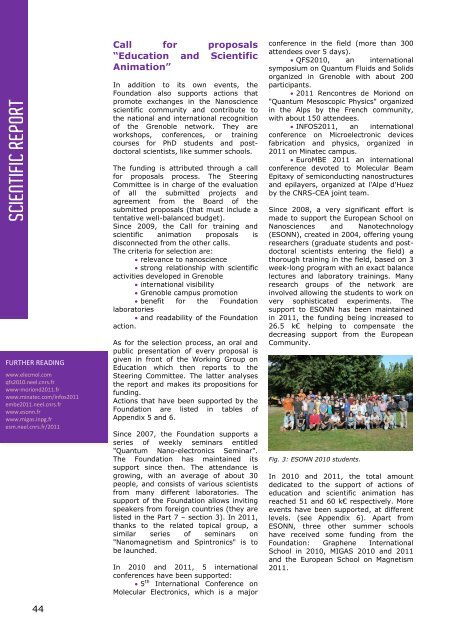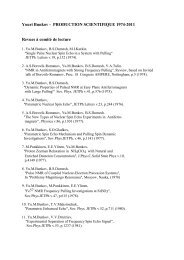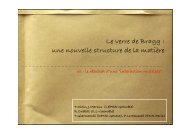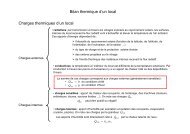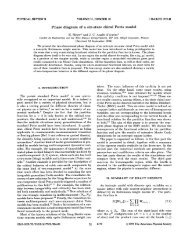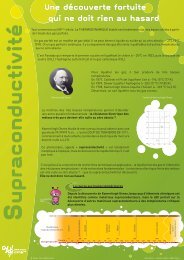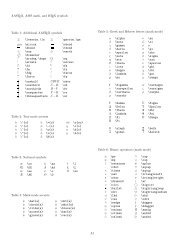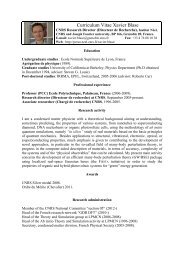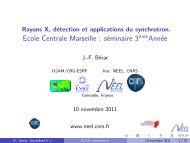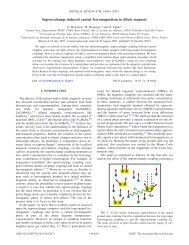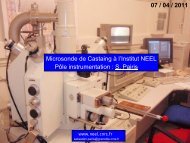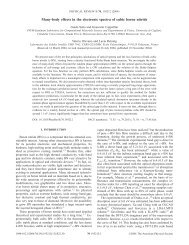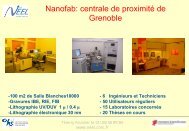Activity Report 2010 - CNRS
Activity Report 2010 - CNRS
Activity Report 2010 - CNRS
You also want an ePaper? Increase the reach of your titles
YUMPU automatically turns print PDFs into web optimized ePapers that Google loves.
SCIENTIFIC REPORT<br />
FURTHER READING<br />
www.elecmol.com<br />
qfs<strong>2010</strong>.neel.cnrs.fr<br />
www-moriond2011.fr<br />
www.minatec.com/infos2011<br />
embe2011.neel.cnrs.fr<br />
www.esonn.fr<br />
www.migas.inpg.fr<br />
esm.neel.cnrs.fr/2011<br />
Call for proposals<br />
“Education and Scientific<br />
Animation”<br />
In addition to its own events, the<br />
Foundation also supports actions that<br />
promote exchanges in the Nanoscience<br />
scientific community and contribute to<br />
the national and international recognition<br />
of the Grenoble network. They are<br />
workshops, conferences, or training<br />
courses for PhD students and postdoctoral<br />
scientists, like summer schools.<br />
The funding is attributed through a call<br />
for proposals process. The Steering<br />
Committee is in charge of the evaluation<br />
of all the submitted projects and<br />
agreement from the Board of the<br />
submitted proposals (that must include a<br />
tentative well-balanced budget).<br />
Since 2009, the Call for training and<br />
scientific animation proposals is<br />
disconnected from the other calls.<br />
The criteria for selection are:<br />
relevance to nanoscience<br />
strong relationship with scientific<br />
activities developed in Grenoble<br />
international visibility<br />
Grenoble campus promotion<br />
benefit for the Foundation<br />
laboratories<br />
and readability of the Foundation<br />
action.<br />
As for the selection process, an oral and<br />
public presentation of every proposal is<br />
given in front of the Working Group on<br />
Education which then reports to the<br />
Steering Committee. The latter analyses<br />
the report and makes its propositions for<br />
funding.<br />
Actions that have been supported by the<br />
Foundation are listed in tables of<br />
Appendix 5 and 6.<br />
Since 2007, the Foundation supports a<br />
series of weekly seminars entitled<br />
"Quantum Nano-electronics Seminar".<br />
The Foundation has maintained its<br />
support since then. The attendance is<br />
growing, with an average of about 30<br />
people, and consists of various scientists<br />
from many different laboratories. The<br />
support of the Foundation allows inviting<br />
speakers from foreign countries (they are<br />
listed in the Part 7 – section 3). In 2011,<br />
thanks to the related topical group, a<br />
similar series of seminars on<br />
"Nanomagnetism and Spintronics" is to<br />
be launched.<br />
In <strong>2010</strong> and 2011, 5 international<br />
conferences have been supported:<br />
5 th International Conference on<br />
Molecular Electronics, which is a major<br />
conference in the field (more than 300<br />
attendees over 5 days).<br />
QFS<strong>2010</strong>, an international<br />
symposium on Quantum Fluids and Solids<br />
organized in Grenoble with about 200<br />
participants.<br />
2011 Rencontres de Moriond on<br />
"Quantum Mesoscopic Physics" organized<br />
in the Alps by the French community,<br />
with about 150 attendees.<br />
INFOS2011, an international<br />
conference on Microelectronic devices<br />
fabrication and physics, organized in<br />
2011 on Minatec campus.<br />
EuroMBE 2011 an international<br />
conference devoted to Molecular Beam<br />
Epitaxy of semiconducting nanostructures<br />
and epilayers, organized at l'Alpe d'Huez<br />
by the <strong>CNRS</strong>-CEA joint team.<br />
Since 2008, a very significant effort is<br />
made to support the European School on<br />
Nanosciences and Nanotechnology<br />
(ESONN), created in 2004, offering young<br />
researchers (graduate students and postdoctoral<br />
scientists entering the field) a<br />
thorough training in the field, based on 3<br />
week-long program with an exact balance<br />
lectures and laboratory trainings. Many<br />
research groups of the network are<br />
involved allowing the students to work on<br />
very sophisticated experiments. The<br />
support to ESONN has been maintained<br />
in 2011, the funding being increased to<br />
26.5 k€ helping to compensate the<br />
decreasing support from the European<br />
Community.<br />
Fig. 3: ESONN <strong>2010</strong> students.<br />
In <strong>2010</strong> and 2011, the total amount<br />
dedicated to the support of actions of<br />
education and scientific animation has<br />
reached 51 and 60 k€ respectively. More<br />
events have been supported, at different<br />
levels. (see Appendix 6). Apart from<br />
ESONN, three other summer schools<br />
have received some funding from the<br />
Foundation: Graphene International<br />
School in <strong>2010</strong>, MIGAS <strong>2010</strong> and 2011<br />
and the European School on Magnetism<br />
2011.<br />
44


